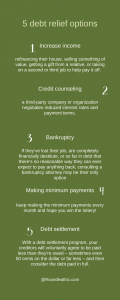Is debt settlement your best option?

If you are in debt and struggling to find a way out, debt settlement may be the best option for you. Continue reading to learn why you should or shouldn’t choose debt settlement.
I’ve sat down with hundreds – if not thousands – of clients over the last few years. Each one with their own unique financial situation and story of how they got there. The one thing that they all have in common is that they have too much debt. They are rapidly running out of options on how to pay off their outstanding debt.
In fact, Americans now have more than one trillion dollars just in credit card debt – and our collective balances are up 3% just from last year! Add in record levels of student loans, medical debts, and not to mention secured debt. The average American family is walking a financial tightrope like never before.
What is debt settlement
Debt settlement, also known as debt relief, is the process of negotiating your current debt amount you owe for a lower amount. Debt settlement is typically done with a lump sum payment. While this may fear people away from choosing debt settlement, it could save you from making monthly payments to your creditors. Debt settlement can be done by yourself or with a debt settlement company.
A debt settlement company negotiates on your behalf so you don’t have to. A typical settlement amount can range from 30%- 65%. Every situation is different and every creditor is different.
Debt relief options
Of course, when consumers find themselves in a significant amount of revolving or other bad debt, it has a profound negative impact on the rest of their finances. Too often, they’re paying only the monthly minimum payment. This means that they’re actually paying high-interest monthly charges over a long time (sometimes, 20 years or more!) just to become debt free.
In the meantime, when we look at their monthly budget, we find that they’re struggling to make ends meet. This results in them not allocating enough to savings, retirement, or other investments.
So what options do you have to effectively get out of debt, move on, and then repair your credit score? While it can be confusing when you’re in that situation, there are essentially five options for you (and not all of them good):
- Some people are “saved” from their debt problems by refinancing their house, selling something of value, getting a gift from a relative, or taking on a second or third job to help pay it off. However, this happens pretty infrequently, and when life throws them another unexpected turn, like a job loss, medical problem, divorce, or the car breaks down, they can find themselves turning to their credit cards again.
- Credit counseling is an option that a lot of consumers opt for. With credit counseling, a third-party company or organization negotiates reduced interest rates and payment terms. However, you still end up spending a considerable chunk of money over the years and years. Not only will your credit score still take a big hit with credit counseling (you’re not paying as agreed), but only a small percentage of people actually complete these programs and become debt-free.
- On the other end of the spectrum, bankruptcy is the best fit for some folks. If they’ve lost their job, are completely financially destitute, or so far in debt that there’s no reasonable way they can ever expect to pay anything back, consulting a bankruptcy attorney may be their only option. Of course, filing for bankruptcy is one of the most damaging things you can do to your credit and will stay on your credit file for seven years or longer.
- Or they can just keep making the minimum payments every month and hope they win the lottery!
- The good news is that there is another option: debt settlement. With a debt settlement program, your creditors will voluntarily agree to be paid less than they’re owed – sometimes even 50 cents on the dollar or far less – and then consider the debt paid in full.

Freedom = Debt Relief
Millions of Americans turned to debt settlement to help them get out of credit card debt during the last economic downturn. In fact, banks, lenders, and credit card companies regularly negotiate to accept debt settlement offers and short payoffs from consumers who are late on their debt payment or have a poor payment history. It’s in their best interest, too, as research proves that they’ll receive far less if the account goes to collections or the borrower declares bankruptcy.
“The first step in repairing your credit is getting your debt under control,” says Jeff Sipes, President of Blue Water Credit, providing credit repair services in San Jose. “Once your debt is under control, you will have much better success in maintaining a healthy credit score. Speaking from my own experience, getting out of credit card debt is one of the hardest yet most rewarding things I’ve done.”
When Is Debt Settlement The Best Option?
Most people realize that continuing to make minimum payments forever – and continuing to slip further behind financially – is not a viable option. It is a vicious circle with no end in sight for debt relief. If you’re working hard just to make minimum payments, but neglecting savings, retirement, and other essential financial safety nets, and the outstanding debt continues to mount, then you should make a change before the situation becomes completely untenable. Find a debt relief option before it is too late.
Most people are faced with one important choice: to declare bankruptcy or find a credit counseling agency. Of course, most people don’t want to start with something as drastic as bankruptcy (and they also may not qualify as there are income and asset limits, etc.) if there’s a better way.
Working with a reputable and experienced debt settlement company like Roundleaf Inc. will help give you financial stability. We negotiate on the clients behalf directly with the creditor and debt collector.
For consumers that qualify, debt settlement allows you to formulate a responsible debt management plan where we’ll work WITH your creditors to accept a smaller payout. Settled debt allows you to become debt-free in a few years or less and avoid the Scarlet Letter of a “BK” on your credit report.
Won’t Debt Settlement Affect My Credit Score?
To be clear, a debt settlement program may impact your credit score. However, keep in mind most of the damage done on your credit report was from your payment history of missing or late payments and not the settlement itself. Because debt settlement is a guarantee of some sort of payment rather than no payment at all, creditors are motivated to settle.
Remember, too, that credit utilization of maxing out all of your credit cards and having too many accounts that you owe to creditors (and the wrong kinds of accounts) is already dinging your credit report and score. The credit damage is already done.
One by one, as debt settlements are complete, your settled debt rapidly starts to vanish. It is then much simpler to rebuild your credit and repair your credit score. The debt settlement process allows you to move on to a much brighter financial future.
Just like a doctor needs to set a broken leg before he or she can put it in a cast so it will heal correctly, you have to eradicate your debt first before repairing your credit score – and that’s why debt settlement is the best option for many consumers.
Not Sure If Debt Settlement Is For You?
Debt settlement may not be the answer for you. However, If you feel like you are drowning in debt, you can take advantage of our debt relief program that will help you minimize outstanding debt with credit counseling, lower your interest rate with debt management, and increase your overall credit rating.
To learn more, schedule a free consultation with our personal finance expert.
